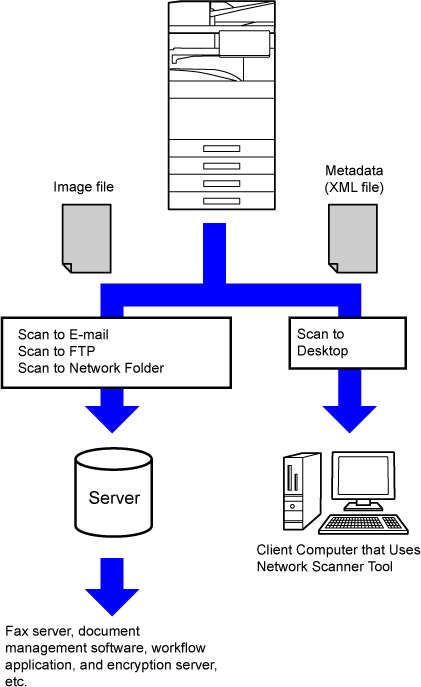When the application integration
module kit is installed, metadata (data indicating the attributes
of the image file and how it is to be processed) is generated based
on pre-stored information and transmitted separately from an image
file that is generated for sending a scanned image. The metadata
file is created in XML format.
By linking the metadata with applications such as document
management software, a workflow application, or an encryption server,
a sophisticated document solution environment can be built.
Using the application integration module kit, information
on a generated image file can be entered at the touch panel and transmitted
along with the image as an XML file.

To configure the settings related to metadata,
select [System Settings] → [Image Send Settings] → [Metadata Settings]→ [Metadata
Entry]
in "Settings (administrator)". (Administrator rights are required.)
Enable metadata delivery.
Store the items (the metadata set) to write to the XML
file that will be generated during scanning. Up to 10 metadata items
can be configured in a metadata set. A stored metadata set can be
selected at the time of transmission.
Addresses specified in "Address Type Allowing Metadata Entry" when a metadata set
is
stored can be selected as transmission destinations at the time
of transmission using one-touch keys, manual entry, or a global
address book search. (Addresses for which metadata entry is not
allowed cannot be specified as transmission destinations.)
When Network Scanner Tool Lite is used in
its factory default configuration, a file will be generated with
a new file name on the PC.
When Network Scanner Tool Lite is used as a means of sending
a metadata file to a third party application, this setting must
be disabled to allow cross referencing between the image file and
XML file by means of the file name generated by the computer.
(When setting the file name in [Options▼], to ensure that
an existing file on the PC is not overwritten by a transmitted file of
the same name, be sure to configure the file name so that name duplication
will not occur; for example, by including a unique extension (the
date, etc.) in the generated file name. If the file name setting
is left blank, the machine will automatically generate a unique
file name.)
Version 06a / bp70c65_usr_06a_en